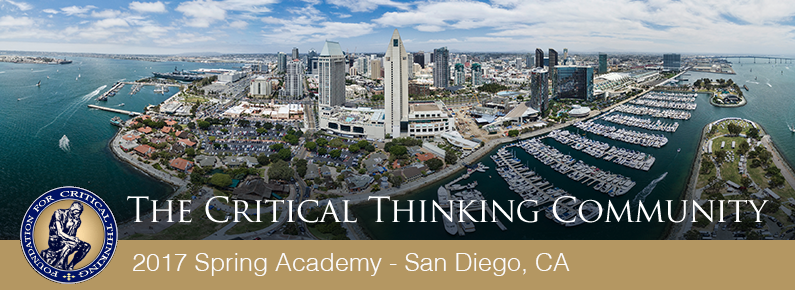
To study well and learn any subject is to learn how to think with discipline within that subject. It is to learn to think within its logic, to:
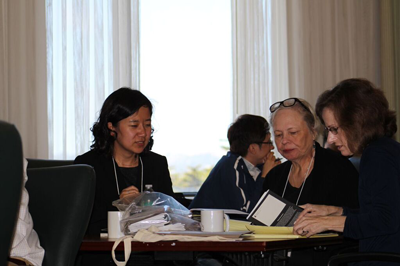
• Raise vital questions and problems within it, formulating them clearly and precisely.
• Gather and assess information, using ideas to interpret that information insightfully.
• Come to well-reasoned conclusions and solutions, testing them against relevant criteria and standards.
• Adopt the point of view of the discipline, recognizing and assessing, as need be, its assumptions, implications, and practical consequences.
• Communicate effectively with others using the language of the discipline and that of educated public discourse.
• Relate what one is learning in the subject to other subjects, and to what is significant in human life.
To become a skilled learner is to become a self-directed, self-disciplined, self-monitored, and self-corrective thinker who has given assent to rigorous standards of thought and gained mindful command of their use. Skilled learning of a discipline requires that one respect the power of it, as well as its - and one’s own - historical and human limitations.
This session will offer strategies for helping students begin to take their learning seriously. It will focus on multiple instructional ideas based on this concept: that substantive teaching and learning can only occur when students take ownership of a subject's most basic principles and concepts. These strategies are rooted in a vision of instruction implied by critical thinking, and an analysis of the weaknesses typically found in most traditional didactic lecture/quiz/test formats of instruction. This session will then focus on some basic instructional strategies that foster the development of student thinking, and on strategies that require students to think actively within the concepts and principles of a subject.
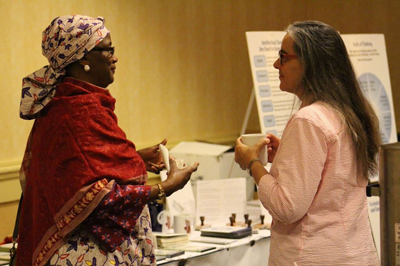
Bringing critical thinking into instruction entails understanding the concepts and principles within critical thinking, and then applying those concepts and principles throughout the curriculum. It means developing powerful strategies that emerge when we begin to understand critical thinking.
In this session we will focus on strategies for engaging the intellect at potentially all levels of instruction. These strategies are powerful and useful, because each is a way to engage students in actively thinking about what they are trying to learn as they are learning. Each represents a shift of responsibility for learning from teacher to student. Through these strategies, students learn to discipline their thinking as they reason their way through content. They learn the importance of using the principles of critical thinking in reasoning through problems and issues in every subject and discipline. (This session is best suited for higher-education faculty.)
Both of these sessions on day one will lay the foundation for the following two days,. Both sessions will introduce you to some of the most basic understandings in critical thinking – namely, how to analyze thinking, how to assess it, and how to develop and foster intellectual virtues or dispositions.
One conceptual set we will focus on is the elements of reasoning, or parts of thinking. These elements or parts are the essential dimensions of thought present whenever and wherever reasoning occurs, independent of whether we are reasoning well or poorly. Working together, these elements shape reasoning and provide a general logic to the use of thought. They are presupposed in every subject, discipline, and domain of human thought.
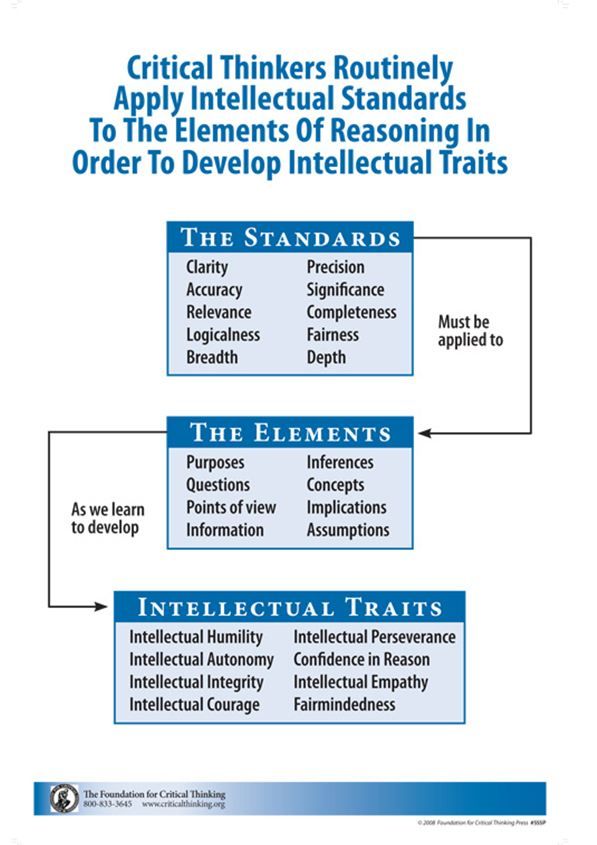
A second conceptual set we will focus on is that of universal intellectual standards. One of the fundamentals of critical thinking is the ability to assess reasoning. To be skilled at assessment requires that we consistently take apart thinking and examine its parts with respect to standards of quality. We do this using criteria based on clarity, accuracy, precision, relevance, depth, breadth, logicalness, and significance. Critical thinkers recognize that whenever they are reasoning, they reason to some purpose (element of reasoning). Implicit goals are built into their thought processes. But their reasoning is improved when they are clear (intellectual standard) about that purpose or goal. Similarly, to reason well, they need to know that - consciously or unconsciously - they are using relevant (intellectual standard: relevance) information (element of reasoning) in their thinking. Furthermore, their reasoning improves if and when they make sure that the information that they are using is accurate (intellectual standard: accuracy).
A third essential conceptual set in critical thinking is that of intellectual virtues or traits. Critical thinking does not entail merely intellectual skills. Rather, it is a way of orienting oneself in the world. It is a way of approaching problems that differs significantly from that which is typical in human life. People may have critical thinking skills and abilities, yet still be unable to enter viewpoints with which they disagree. They may have critical thinking abilities, yet still be unable to analyze the beliefs that guide their behavior. They may have critical thinking abilities, yet still be unable to distinguish between what they know and what they don't know, to persevere through difficult problems and issues, to think fairmindedly, or to stand alone against the crowd. Thus, in developing as a thinker and fostering critical thinking abilities in others, it is important to develop intellectual virtues - virtues of fairmindedness, intellectual humility, intellectual perseverance, intellectual courage, intellectual empathy, intellectual autonomy, intellectual integrity, and confidence in reason.
Finally, we will illuminate two intrinsic barriers to critical thinking development: egocentric and sociocentric thought. These natural pathological tendencies will be briefly introduced and explored.
In short, we introduce, on the first day of our academy, the foundations of fairminded critical thinking.
The purpose of assessment in instruction is improvement. The purpose of assessing instruction for critical thinking is improving the teaching of discipline-based thinking (historical thinking, biological thinking, sociological thinking, mathematical thinking, etc…). It is to improve students’ abilities to think their way through content using disciplined reasoning.
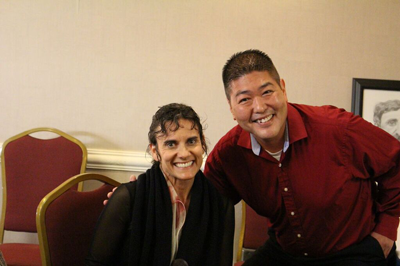
However, there is often a crucial missing link between what we teach and how we assess what we teach. In instruction we tend to think of our primary purpose as “teaching the content.” Temporally we tend to dedicate the first part of a course to “teaching the first part of the content.” We then at some point “assess” what students have “learned” so far (often with a “test” which covers the “content” the students have presumably learned during this first period). Frequently, this same pattern is repeated several times in a course, so that instructors come to believe they have thoroughly “covered” their content as long as students perform at a “sufficient” level on their tests.
But to internalize powerful ideas embedded in content entails assessing one’s learning while one is engaged in it. Learning and the assessment of learning are intimately integrated in the mind of the disciplined thinker. Put another way, in the skilled reasoner, learning and accurate assessment of that which has been learned are intertwined. Students come to take responsibility for their learning when they understand the intimate relationship between appropriate assessment of thought and the internalization of content. It is this for which we aim when we bring critical thinking and assessment to the core of teaching and learning.
This session will focus on methods for systematically integrating assessment through critical thinking into the teaching and learning process.
Socratic questioning is disciplined questioning that can be used to pursue thought in many directions and for many purposes, including: to explore complex ideas, to get to the truth of things, to open up issues and problems, to uncover assumptions, to analyze concepts, to distinguish what we know from what we don’t know, and to follow out logical implications of thought. The key to distinguishing Socratic questioning from questioning per se is that Socratic questioning is systematic, disciplined, and deep, and usually focuses on foundational concepts, principles, theories, issues, or problems.
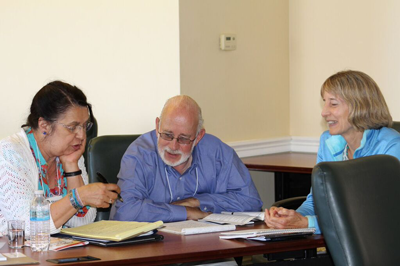
The art of Socratic questioning is intimately connected with critical thinking because the art of questioning is important to excellence of thought. What the word “Socratic” adds to the art of questioning is systematicity, depth, and an abiding interest in assessing the truth or plausibility of things. Critical thinkers not only ask questions, they ask deep, significant, unbiased questions.
Both critical thinking and Socratic questioning share a common end. Critical thinking provides the conceptual tools for understanding how the mind functions in its pursuit of meaning and truth; Socratic questioning employs those tools in framing questions essential to the pursuit of meaning and truth.
This two-day session will include an introduction to the theory and practice of Socratic Questioning, through emphasis on the analysis and assessment of reasoning. Participants will be engaged in Socratic dialogue, and will gain introductory experience in Socratic questioning that, with practice, can lead to an increasingly richer understanding of the power inherent in disciplined questioning as a tool for teaching and learning.
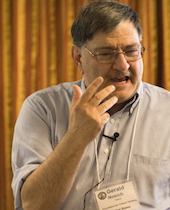
Dr. Gerald Nosich is an authority on critical thinking and Senior Fellow at the Foundation for Critical Thinking; he has given more than 150 national and international workshops on the subject. He has worked with the U.S. Department of Education on a project for the National Assessment of Higher Order Thinking skills, has served as the Assistant Director of the Center for Critical Thinking, and has been featured as a Noted Scholar at the University of British Columbia. He is Professor Emeritus at both SUNY Buffalo State and the University of New Orleans. He is the author of two books including Learning to Think Things Through: A Guide to Critical Thinking Across the Curriculum.

Dr. Linda Elder is an educational psychologist and a prominent authority on critical thinking. She is President and Senior Fellow of the Foundation for Critical Thinking. Dr. Elder has taught psychology and critical thinking at the college level, and has given presentations to more than 50,000 educators. She has coauthored four books and 24 Thinker's Guides on critical thinking. Concerned with understanding and illuminating the relationship between thinking and affect, and the barriers to critical thinking, Dr. Elder has placed these issues at the center of her thinking.